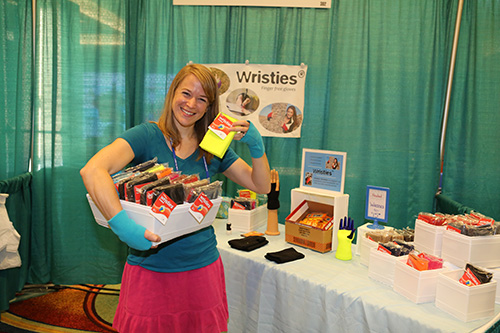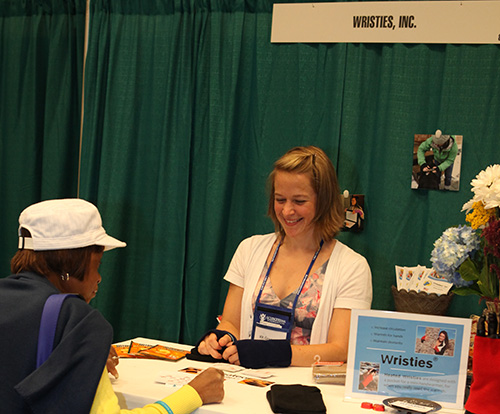|
Q&A with KK Greer, Founder of Wristies
Thursday, January 15, 2015
By: Christina Relacion
KK Greer started her company Wristies® when she was just 10 years old. Her product has been a life-changing resource for people living with scleroderma, Raynaud Phenomenon and other conditions that require people to stay warm. Just two years ago, she was contemplating closing down her business, until she exhibited at the Scleroderma Foundation's National Patient Education Conference in Atlanta. KK talked recently with our "Voice" staff about her business and experience with the scleroderma community.
 Voice: How did Wristies begin? Voice: How did Wristies begin?
KK: I started this business with my mom in 1994, when I was 10 years old. I was playing outside in the snow, and was tired of the ice and snow going up my sleeves. My mom gave me the best advice, “Do something about it.” I made a fleece tube to go over my wrists and cut a hole for the thumb. The following week, I went sledding with my Girl Scout troop. Another girl’s father owned a bike shop and asked if he could buy some for the shop. Another girl’s dad was an inventor, and he put me in touch with his patent attorney.
The local TV news heard about my business, and Brookstone’s buyers saw the product on TV. Wristies ended up featured in the Brookstone and Skymall catalogs and on “The Oprah Winfrey Show” and “The Today Show.”
Voice: Who was the initial audience for Wristies?
KK: We focused on the outdoor market for a long time. I was on the U.S. rock climbing team, and I love being outside, so I continued to go after the outdoor market for a long time.
Voice: Tell me a little bit more about your mom.
KK: I had taken some time off to explore other jobs after I graduated from high school. I had already run a business for half my life at that point. I eventually graduated from college. Then, I worked for ABC’s “Extreme Makeover: Home Edition,” which involved traveling.
Then, I got a call from my mom. She was sick with breast cancer and was on chemotherapy. She asked me to come back home and help with the Wristies business, which she had been running for many years. About a year after I returned home, she passed away, leaving me with a business that I didn’t necessarily want anymore.
 Voice: Describe the first time you exhibit for the scleroderma community? Voice: Describe the first time you exhibit for the scleroderma community?
KK: Traveling to exhibit at shows is a major expense for small companies. I had been picky, and exhibited only at shows that had tens of thousands of attendees, yet, I was only moderately successful. The Scleroderma Foundation conference was small, with just 500 attendees. It was held in Atlanta, in the middle of the summer, and I sell a winter product. I don’t know how they [Tracey Sperry, the Foundation’s director of development] convinced me to do it!
The experience totally changed my attitude toward my company. My understanding of scleroderma, my expectation for the company and discovering where I need to focus my attention all contributed to one of the most powerful experiences I have ever had. I was in tears most of the weekend. It was incredible. People who have worn Wristies told me it was the only product that had given them comfort. Others said my product allowed them to sleep through the night for the first time because they didn’t feel pain. One woman was a musician, and because of Wristies, she didn’t have to give up music.
Because of this, I can now focus my product on people who need it. It makes so much business sense to put my time, attention and money where my product is needed most. I had thought Wristies were needed outdoors, where I was playing, and discovered that they were needed so much more by groups like the scleroderma community.
Voice: Is there anything that you would like to tell the scleroderma community?
KK: I was so grateful to be invited to the conference in Atlanta. I just have a small business in New Hampshire, so this means a lot to me. I’m so grateful for all the opportunities to have my business grow and expand to help and warm people. The conference was full of the most genuine, kind and sincere people that I have ever been surrounded with. I appreciated that it was focused on educating people with this condition and helping people improve their quality of life, including different opportunities to find relief, comfort and support.
|
|
|



 Voice: How did Wristies begin?
Voice: How did Wristies begin? Voice: Describe the first time you exhibit for the scleroderma community?
Voice: Describe the first time you exhibit for the scleroderma community?